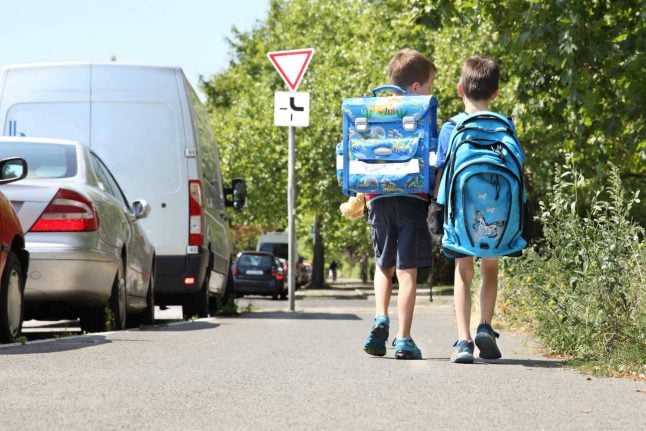This Thursday, southern Baden-Württemberg will be the last state to go on summer vacation, while in northeastern Mecklenburg-Western Pomerania the new school year is already set to begin next Monday, August 3rd.
Several other states will begin opening their doors to schools in the days and weeks that follow.
READ ALSO: Here's when summer school holidays start across Germany's 16 states
Before the summer, state education ministers agreed to resume regular operations in the schools, and also to waive the social distancing rules “provided the incidence of infection allows it”.
In mid-July they presented a new hygiene framework to allow for the safe return of children to the classroom.
Teachers under pressure
Yet according to the German Teachers' Association, schools are not sufficiently prepared to welcome back students.
Association President Heinz-Peter Meidinger told DPA that they fear “a big mess”.
The Federal Parents' Council expects more school closures as coronavirus cases rise, and they assume that the school year “will by no means run according to plan,” said chairman Stephan Wassmuth.
According to Meidinger, a lack of teaching staff will make it difficult for schools to fully reopen. Education trade unions estimate that up to 20 percent of teachers belong to the risk group and would not be available for in-person teaching.
The hygiene rules for schools laid down by the education ministers have also been criticised for being impractical, for example the requirement for regular ventilation (stoßzulüften – or fully opening the windows)
“At many schools, the windows in higher classrooms cannot be opened or can only be opened slightly for safety reasons,” said Meidinger.
Sticking together
Robert Koch Institute (RKI) president, Lothar Wieler, said it was important to keep class groups together and not to mix up the classes, as they typically are at secondary schools. So-called “epidemiological units” must be formed, he said Tuesday in Berlin.
Yet Wieler said the measure would only make sense if pupils spent their free time with those from the same “unit”.
Wassmun said he expects school closures in some regions due to the pandemic and demanded concrete plans from the federal states for a “Scenario B” with a mixture of both classroom and distance learning.
READ ALSO: State by state: When (and how) will Germany's schools reopen again?
“Those who did not prepare this are acting highly negligent and against the students.”
Teachers' Association President Meidinger also thinks it would be sensible for states to draw up lists of subject areas “whose teaching is dispensable in the next school year” as a precautionary measure.

A pupil in Berlin in March 2019. Photo: DPA
“We have to be honest. There will not be ideal teaching conditions for a long time yet,” he said.
In order to prepare for further possible school closures, Meidinger believes that the billions in subsidies earmarked for school digitization must now be “pumped into the schools at full speed”.
'Teaching disaster must be avoided'
Left (Die Linke) party leader Katja Kipping said on Tuesday that there was a “dramatic failure of education policy through inaction” and called for school laptops for all pupils, as well as expert working groups at the federal and state level on online teaching.
Free Democrats (FDP) deputy faction leader Katja Suding called on school boards and states to use the remaining holiday period to ensure that face-to-face lessons could take place to the greatest possible extent after the holidays.
“A teaching disaster like at the beginning of the coronavirus must not be allowed to happen a second time,” she said, referring to early March when schools across Germany indefinitely closed their doors – open without a plan for reopening.
READ ALSO: All German states announce school and Kita closures
Germany's Doctors Association stressed that, in whatever way it occurs, children needed to return to to schools.
Without sufficient instruction over a longer period of time, kids are “threatened with enormous problems in their physical and mental development,” said president Klaus Reinhardt.
Key vocabulary
Summer holidays – (die) Sommerferien
Mess – (das) Durcheinander
Social distancing rules – (die) Abstandsregel
Teaching conditions – (die) Unterrichtsbedingungen
We're aiming to help our readers improve their German by translating vocabulary from some of our news stories. Did you find this article useful? Let us know.



 Please whitelist us to continue reading.
Please whitelist us to continue reading.
Member comments